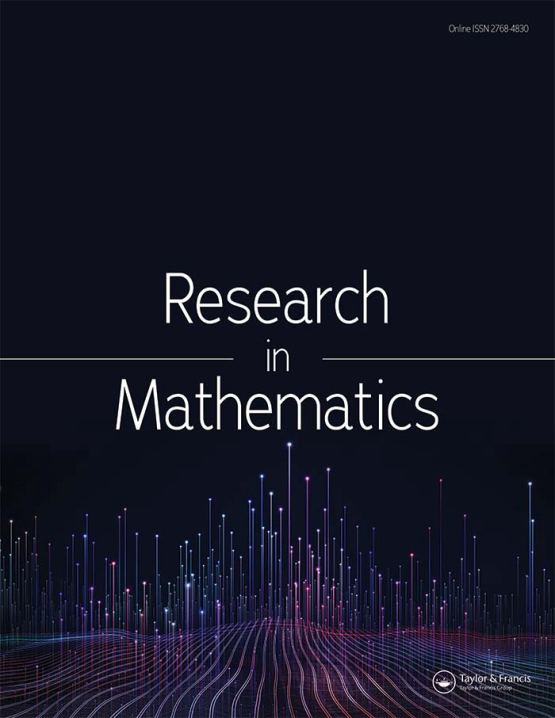Submit a Manuscript to the Journal
Research in Mathematics
For an Article Collection on
Combinatorial aspects of Algebraic Structures
Manuscript deadline


Article collection guest advisor(s)
Associate Professor Irina Cristea,
University of Nova Gorica
irina.cristea@ung.si
Combinatorial aspects of Algebraic Structures
Algebraic structures model, from a mathematical point of view, the interaction of elements within a particular set based on different rules, called axioms. Therefore they are non-empty sets endowed with some operations, called also compositions lows, that are functions combining two elements from the underlying set into a new element of the same set (this is the case of the classical algebraic structures) or in a non-empty subset of elements of the underlying set (this happens in the hypercompositional structures). Algebraic structures provide a precise language to describe and analyse mathematical objects, enhancing clarity and rigor.
Algebraic structures are fundamental in different research fields, spanning from cryptography, coding theory, physics, to computer science, and engineering. It is well-known that group theory is used to study symmetries in nature, physics, and chemistry, while elements from hypergroup and hyperring theory have been used to solve problems in number theory, geometry, or algebraic topology.
The Article Collections aims to publish original research articles and overview papers on arguments related (but not limited) to:
- semigroups and semihypergroups,
- groups and hypergroups,
- semirings,
- rings and hyperrings,
- nearrings and near-hyperrings,
- fields and hyperfields,
- modules and hypermodules,
- ordered algebras and ordered hyperalgebras, etc.
Theoretical aspects of the algebraic structures as well as their applications and connections with other fields (as graph theory, fuzzy sets, logics, geometry, number theory, probability, topology, etc.) should be clearly emphasized in the submitted manuscripts.
Keywords:semigroup and group, semihypergroup and hypergroup, ring and hyperrings, field and hyperfields, vector space and hypervector space, ordered structure
Manuscript Submissions:
Manuscript submission is open until 31st January 2026.
Please carefully review the journal scope and author submission instructions prior to submitting an abstract as it will be rejected if it does not fall within the scope of the journal.
All manuscripts submitted to this Article Collection will undergo desk assessment and peer-review as part of our standard editorial process. Manuscripts which do not fall within the scope of the journal will be rejected.
To submit your papers to this Article Collection, please:
- Check "yes" for the question, "Are you submitting your paper for a specific special issue or article collection?"
- Select the relevant Article Collection from the drop-down menu under the question, "Combinatorial aspects of Algebraic Structures"
Remember to include the 10% Discount code: OAMA-2026-C36146 at the point of submission before you submit your manuscript as discount codes cannot be applied retroactively.
We do have a limited amount of 20% Discount codes only available for those who are able to submit an Abstract. It should be noted that discount codes cannot be combined and that only the higher discount would be applicable.
Please contact Christopher Montgomery, Commissioning Editor, with any other queries and discount codes regarding this Article Collection.
Article Collection Guest Advisors
Associate Professor Irina Cristea works at the University of Nova Gorica, Slovenia, where she leads the Centre for Information Technologies and Applied Mathematics. Her research interests are related to the theory of hypercompositional algebra, having published more than 80 articles in journals indexed by Scopus or Web of Science and co-authored one book “Fuzzy Algebraic Hyperstructures: An Introduction”, published by Springer in 2015. Over the past 4 years, she has been acted as chief editor of Italian Journal of Pure and Applied Mathematics and as a member of the editorial board of other international journals. Besides she has been guest editor of 5 special issues related to algebraic structure theory.
Benefits of publishing open access within Taylor & Francis
Global marketing and publicity, ensuring your research reaches the people you want it to.
Article Collections bring together the latest research on hot topics from influential researchers across the globe.
Rigorous peer review for every open access article.
Rapid online publication allowing you to share your work quickly.
Submission Instructions
Article Publishing Charges:
The standard article publishing charge (APC) for this journal is $ 2195 / £ 1756 / EUR 2110 / AUD 3060. A discounted rate applies to replication studies and letters, plus VAT or other local taxes where applicable in your country. There is no submission charge.
Please visit the APC Cost Finder page to find the APC applicable to your specific country and article type.
If you are based at an institution or associated with a funder that has an open access publishing agreement with Taylor & Francis, you might be eligible for APC support. Please see details here.
We offer discounts and waivers for authors in developing countries as defined by the World Bank, either 50% or 100% depending on where the institution of the corresponding author is located. Please see details here.
We will consider requests for discretionary waivers from researchers who aren’t eligible under the above policies. Please note that discounts must be applied at the Charges stage of the submission process when the APC quote is confirmed and may not be considered after submission.
If you have any questions about eligibility, please use the Contact Us form.
All manuscripts submitted to this Article Collection will undergo desk assessment and peer-review as part of our standard editorial process. Guest Advisors for this collection will not be involved in peer-reviewing manuscripts unless they are an existing member of the Editorial Board. Please review the journal Aims and Scope and author submission instructions prior to submitting a manuscript.
